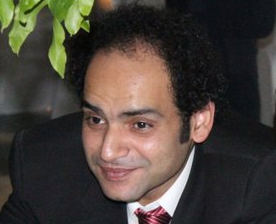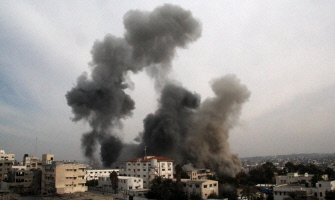
On my way back home from a friend’s house on Friday night I was wondering what I would write my article about in a few hours, since I usually write on Saturday mornings. Well, I was handed the topic out of the blue.
What I am about to tell you took place between Friday night and Saturday morning. It did not happen to someone I know or to someone who told me about it. I personally experienced what happened. What I will tell you happened in Cairo, not in some remote city. It happened on the street where I live, in Zamalek, supposedly one of Cairo’s fancy neighbourhoods. Lastly, what happened was orchestrated by people who are my neighbours and who are also the workers, owners and clientele of one of Zamalek’s oldest restaurants and bars; a place called Don Quichotte.
As a Zamalek resident, I pay high monthly car parking fees. Those who go out in Zamalek, and believe me they are many, know very well how difficult it is to find parking in the neighbourhood. Finding a parking spot in Zamalek often means giving in to parking mafias that dominate the streets.
The street where I live, and where Don Quichotte is, is a very crowded street. Moreover, due to a problem on a parallel street, my street has suddenly become a two-way street. Every night and day is a hassle between drivers getting in each other’s faces on a street where six rows are parked and a tiny lane left for cars. It is the law of the Zamalek parking mafia: six rows of parked cars in a street with one lane left open for traffic. Unfortunately, the owners of bars, restaurants and cafes like Don Quichotte are responsible for allowing this mafia to exist because otherwise their customers would not be able to park.
After travelling 10 metres in 45 minutes due to traffic made by triple parked cars I completely lost my mind. I started yelling at people that the street belongs to all of us and that I have the right to live on a street that only has two parking rows. I started yelling that the rich clients of Don Quichotte and the powerful owners of the place are a lot less important than the ones who actually live on the street. In the middle of my rage I used a cuss word against one of those who were telling me a wrong building number other than the one I was in front of.
As a result of that, I was dragged by a man in his late 40’s, beaten in all possible ways, thrown on the ground, punched everywhere starting with my head and ending with my ankles. My glasses were intentionally broken, my silver necklace intentionally ripped off, and I was surrounded by at least 10 people; at least six of whom were beating me up.
As I was being almost killed on the ground in front of Don Quichotte by some of its clients, residents of the building and parking attendants, I began experiencing breathing difficulty. Since I am diabetic and have a herniated disk in my back, I am not exactly in the best of health. From the intensity of their beating, I felt I could not breathe and I felt the beginnings of a diabetic coma. I raised my hands and tried to ask them to stop beating me because I felt like I was dying. To my surprise, it took them maybe four minutes until they decided to stop. During these four minutes one of the residents in the building was rejoicing that I was being hit (I think he was the one at whom I cussed). As people told him “he is diabetic and he is dying,” his response was, and I quote: “Leave him to die, it is better if he is dead, kill him, he deserves to die, he is an impolite boy!” Of course I would hate to think what exactly this man does with his children when they make impolite mistakes.
After they stopped hitting me and as I was trying to get myself together after all this humiliation, the guy who was hitting me came and told me a joke. Talk about someone who does not understand the concept of timing!
Of course I did not find his joke funny and I did not laugh. I just made a sarcastic facial expression as if I was laughing. To my surprise, he did not like that and started beating me up again, simply because I did not respect him enough to laugh to his jokes! Yes, such people exist. The Don Quichotte people around me as they were helping him hit me started to blame me because I teased and upset him.
I went back home not knowing what to do, feeling like someone whose life has no value or worth. I wanted to feel like someone who could make a mistake and cuss somebody, but it never crossed my mind that those who make such mistakes deserve a nearly fatal public beating in Cairo these days. I wanted to feel like a human being, a man who is allowed to feel safe, not wherever he goes but simply on the street where he lives. While thinking about what to do, I got the idea to go to the police station to file a complaint.
I have never walked into a police station to file a complaint against someone before. The only times I have been to police stations were for work-related reasons, and that usually meant I was “taken” to police stations and state security offices. I went inside with flashbacks to scenes from 28 January all the way to Friday afternoon where the police was bombing little kids with teargas on Qasr Al-Nil Bridge. But I decided to go and exercise my rights as a citizen.
Surprisingly, I was welcomed warmly. The two young officers who met me at the Zamalek police station Saturday morning were right out of CSI; they were nice caring cops! I actually feel strange writing that.
They listened to what I had to say, were moved by what happened and began filing an official complaint. Then they took me to a state hospital to have my injuries documented, and there were a lot by the way. Finally I walked out of that police station feeling I was a citizen with a certain number of rights. Actually I felt a bit grateful to the police as well, which is a very uncomfortable feeling.
But this is not my diary. I actually intend to relay some important realisations.
First, we absolutely have a different code of public morality than the stereotypical one they tell us about which includes values like the many should step in to help the few.
Second, our streets are being run by minor gangs, whether they are car attendants, restaurant workers or any other occupation that requires control of streets. Unfortunately, it is the very system that is responsible for the presence of these gangs in the first place.
Third, there are decent police officers in Egypt. It is impossible to generalise the attitude of all police officers. But the presence of positive independent cases suggests that the real problem with the Egyptian police lies not in individuals as much as with how corrupt and unaccountable the system is. In fact, attempting to reform the system is much easier than attempting to reform the individual. Of course there will always be police officers guilty of wrongdoing and I continue to demand they be taken off the street and tried. But at the same time, it is an extremely reassuring feeling to have a police officer or a force that you can trust. There are few people, exceptional individuals in the police who must be brought to light; they must be used as a role model for their corrupt colleagues.
President Mohamed Morsi and the distinguished Shura Council members, when was the last time you discussed institutional reform in Egypt? Was it before you discussed banning ballet or after you were informed of the identity of those responsible for the Sinai kidnappings?
Finally, I would like to express my gratitude to those two police officers in the Zamalek police station for all the help they offered me and for how friendly they were.



